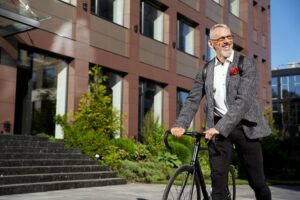 A big examine revealed in BMJ Public Well being discovered that individuals who cycle or stroll to work or college might need higher psychological and bodily well being than those that don’t. The analysis confirmed the best well being advantages amongst cyclists, who had a 47% decrease danger of dying from any trigger.
A big examine revealed in BMJ Public Well being discovered that individuals who cycle or stroll to work or college might need higher psychological and bodily well being than those that don’t. The analysis confirmed the best well being advantages amongst cyclists, who had a 47% decrease danger of dying from any trigger.
Lively journey, which incorporates strolling and biking, is among the best and most sustainable methods to extend each day bodily exercise. Researchers observe that growing proof helps lively journey’s well being advantages. Nonetheless, earlier research have usually been restricted by quick monitoring durations, slim age ranges, and restricted well being outcomes.
To deal with these limitations, the researchers used the Scottish Longitudinal Examine (SLS) knowledge, which incorporates 5% of the Scottish inhabitants based mostly on census knowledge from 1991, 2001, and 2011. The examine centered on individuals aged 16 to 74 in 2001 who travelled to work or college within the UK. After excluding incomplete knowledge, the ultimate evaluation included 82,297 individuals.
Contributors had been requested about their primary mode of journey for the longest a part of their commute. Strolling or biking had been thought of as lively journey, whereas all different strategies had been thought of “inactive.” The responses had been linked to nationwide hospital data for varied well being points, together with heart problems, most cancers, street site visitors collisions, and psychological well being drug prescriptions from 2001 to 2018.
The examine thought of a number of elements that might affect the outcomes, reminiscent of age, intercourse, pre-existing well being situations, socioeconomic standing, and distance to work or college.
Between 2001 and 2018, 4,276 individuals died (simply over 5% of the examine group), with virtually half dying from most cancers (2023; 2.5%). Over 64% of individuals (52,804 individuals) had been admitted to the hospital for varied causes, together with heart problems (12%), most cancers (7%), and street site visitors collisions (3%).
Moreover, 38.5% of individuals had been prescribed medicine for heart problems between 2009 and 2018, and 41% had been pharmaceuticals for psychological well being points throughout the identical interval.
Comparisons with inactive commuters confirmed that those that walked to work or college had been extra more likely to be feminine, youthful, shift staff, residing in cities, and commuting shorter distances. In addition they tended to have decrease family incomes and academic ranges and had been much less more likely to have dependent kids. Bicycle owner commuters had been extra more likely to be males, youthful, metropolis residing, and shift staff, they usually had been much less more likely to be owners or caregivers.
After adjusting for these elements, the examine discovered that lively commuting was linked to decrease dangers of dying and psychological and bodily well being points in comparison with inactive commuting. Particularly, biking was related to a 47% decrease danger of dying, a ten% decrease danger of any hospital admission, and a 24% decrease danger of hospital admission for heart problems.
Cyclists additionally had a 30% decrease danger of being pharmaceuticals for heart problems. Their danger of dying from most cancers was 51% decrease. Their danger of being hospitalized for most cancers was 24% decrease than others. Their danger of being pharmaceuticals for any psychological well being issues was additionally decreased by 20%. Nonetheless, the possibilities of bike owner commuters being hospitalized after a street site visitors collision had been twice as possible in comparison with inactive commuters.
Strolling to work or college was related to an 11% decrease danger of hospital admission for any trigger and a ten% decrease danger of hospital admission for heart problems. It was additionally linked to 10% and seven% decrease dangers of being pharmaceuticals for heart problems and psychological well being points, respectively.
Whereas that is an observational examine and can’t definitively set up trigger and impact, the researchers acknowledged some limitations. For instance, the census knowledge solely displays one time limit and doesn’t embrace normal bodily exercise ranges. Moreover, prescription knowledge was solely out there from 2009 onward, and the census knowledge didn’t account for multimodal journeys, probably resulting in overlap between lively and inactive commuters.
The researchers concluded that their examine provides to the proof that lively commuting gives important well being advantages and might help cut back sickness and dying charges. They highlighted the significance of getting a protected biking infrastructure, as bike owner commuters had a better danger of street site visitors accidents.

